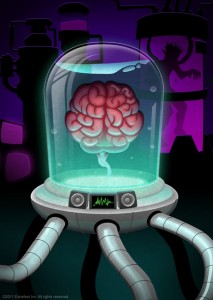The danger with blogging, at least the way I do it, is that the blog can become a place to be unhappy. To bemoan the state of the political nation. Or to mark mournful anniversaries. We forget to celebrate what we have, to cherish the small moments. One thing I love is walking my boy Giorgie to school. So here I am, celebrating and cherishing, in what may become a School Run series.
5. The phenomenology of the school run
How’re things going at school? I gather you’ve had a tricky couple of days? Some ‘red flags’ and –

How do you know you’re not just a brain in a jar?
I need to ask you how things are going at school.
We could be just brains, being controlled by a scientist or a programmer.
And what about tonight – will you remember to be polite, please? – who’re you having tea with after school?
George.
Which George?
George Osborne.
Right.
You know him. The second most important man in the country.
Is George’s surname really Osborne?
No. None of this could be real. Like SIMS.
It would have to be a very complicated program, or a very brilliant scientist, to give us such detailed and consistent experiences – this bed, this kitchen, this house, this street, these signs, these cars, these faces, these smells, these sounds….
It could be a very complicated program. It could have been running for thousands of years, so of course it would be consistent and have lots of detail.
We have agency. We aren’t just inert passengers in a scripted world. We can change our world. I could walk into that traffic and stop the cars.
You can do that in an RPG game. You can shoot people.
Why would anyone bother to go to such lengths to create this fictional world? Why wouldn’t such a clever alien just come round for a cup of tea, instead of spending so much time fooling us into thinking we were leading real lives?
Maybe they just want to. We do things like that. We create virtual worlds, like the SIMS.
Right. But will you remember to be polite with George’s Mum? Knife and fork and please and thank you?
I don’t know. It depends what happens.
